(完整版)(完整版)英语动词《第三人称单数形式》的变化规则
动词第三人称单数变化规则
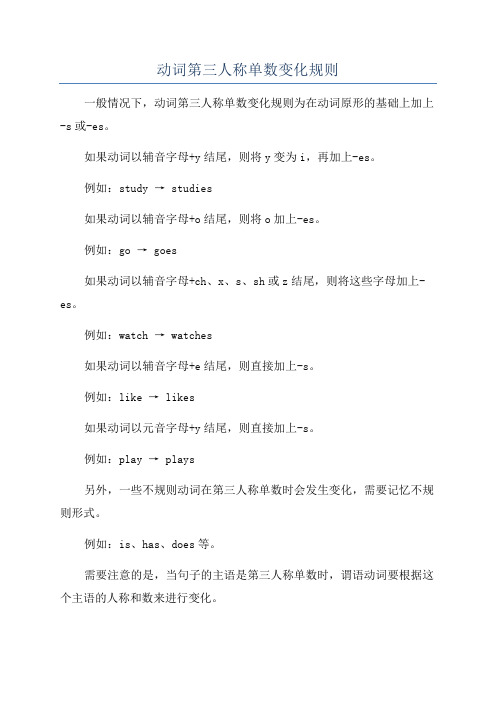
动词第三人称单数变化规则
一般情况下,动词第三人称单数变化规则为在动词原形的基础上加上-s或-es。
如果动词以辅音字母+y结尾,则将y变为i,再加上-es。
例如:study → studies
如果动词以辅音字母+o结尾,则将o加上-es。
例如:go → goes
如果动词以辅音字母+ch、x、s、sh或z结尾,则将这些字母加上-es。
例如:watch → watches
如果动词以辅音字母+e结尾,则直接加上-s。
例如:like → likes
如果动词以元音字母+y结尾,则直接加上-s。
例如:play → plays
另外,一些不规则动词在第三人称单数时会发生变化,需要记忆不规则形式。
例如:is、has、does等。
需要注意的是,当句子的主语是第三人称单数时,谓语动词要根据这个主语的人称和数来进行变化。
英语单三变化规则表

英语单三变化规则表在英语中,动词的单三变化规则是指动词在第三人称单数时变化的规则。
下面是英语单三变化规则表。
1. 一般情况下,动词加-s。
例如:- He walks to school every day.- She speaks French fluently.2. 如果动词以-s,-x,-sh,-ch或-o结尾,加-es。
例如:- He watches TV in the evening.- She fixes the computer when it breaks down.3. 如果动词以辅音字母+y结尾,变y为i再加-es。
例如:- He studies hard for his exams.- She tries her best to help others.4. 如果动词以元音字母+y结尾,加-s。
例如:- She buys a new dress for the party.- He enjoys playing basketball with his friends.5. 如果动词以辅音字母+o结尾,加-es。
例如:- He goes to bed early every night.- She does her homework before watching TV.6. 如果动词以元音字母+o结尾,加-s。
例如:- He plays the guitar very well.- She has a lot of hobbies.7. 如果动词以-s,-x,-sh,-ch或-o和辅音字母+y结尾,加-s。
例如:- He fixes the cars when they break down.- She watches the movies on weekends.以上就是英语单三变化规则表,希望对大家有所帮助。
记住这些规则,能够帮助你更加流利地运用英语。
(完整版)动词变第三人称单数规则
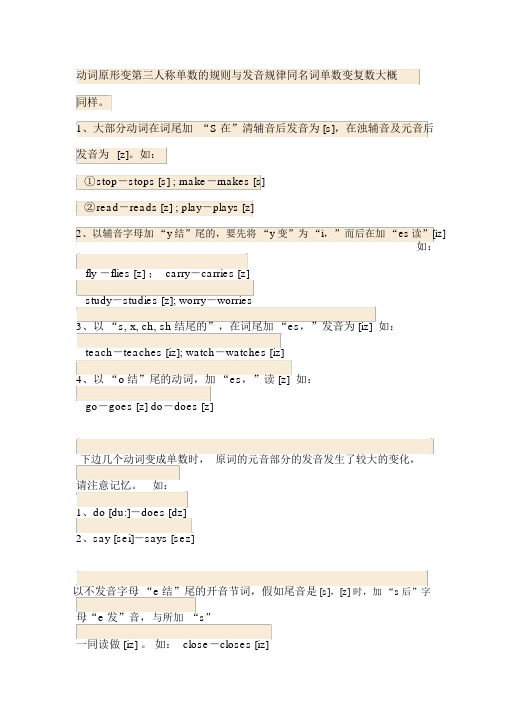
动词原形变第三人称单数的规则与发音规律同名词单数变复数大概同样。
1、大部分动词在词尾加“S在”清辅音后发音为 [s],在浊辅音及元音后发音为[z]。
如:①s top-stops [s] ; make-makes [s]②r ead-reads [z] ; play-plays [z]2、以辅音字母加“y结”尾的,要先将“y变”为“i,”而后在加“es读”[iz]如:fly -flies [z] ; carry-carries [z]study-studies [z]; worry-worries3、以“s, x, ch, sh结尾的”,在词尾加“es,”发音为 [iz] 如:teach-teaches [iz]; watch-watches [iz]4、以“o结”尾的动词,加“es,”读 [z] 如:go-goes [z] do-does [z]下边几个动词变成单数时,原词的元音部分的发音发生了较大的变化,请注意记忆。
如:1、do [du:]-does [dz]2、say [sei]-says [sez]以不发音字母“e结”尾的开音节词,假如尾音是[s],[z] 时,加“s后”字母“e发”音,与所加“s”一同读做 [iz] 。
如: close-closes [iz]be 动词包含: am, is, are。
第三人称单数用is;过去式为was;复数用 are,过去式为 were.除上述规律外,还应注意下边三点:1.动词 have ,碰到主语是第三人称单数时,要用 has;动词 be 的第三人称单数形式是is。
2.含有动词第三人称单数形式的句子变否认句时,要用 doesn't + 动词原形,如:He goes to school at six in the morning. 变(否认句 ) → He doesn't go to school at six in the morning.3.对含有动词第三人称单数形式的句子发问时,要用助动词does,如:She goes home at five every day.对(划线部分发问 ) → When / What time does she go home every day?一般此刻时中的第三人称单数形式在一般此刻时中,当主语是第三人称单数时,谓语动词要用第三人称单数形式,即常在动词原形后加-s 或-es。
英语动词《第三人称单数形式》的变化规则15435
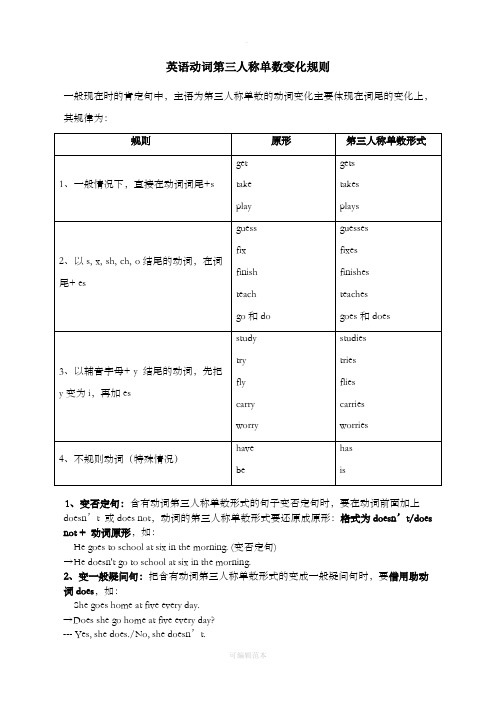
英语动词第三人称单数变化规则一般现在时的肯定句中,主语为第三人称单数的动词变化主要体现在词尾的变化上,其规律为:1、变否定句:含有动词第三人称单数形式的句子变否定句时,要在动词前面加上doesn’t 或does not,动词的第三人称单数形式要还原成原形:格式为doesn’t/does not + 动词原形,如:He goes to school at six in the morning. (变否定句)→He doesn't go to school at six in the morning.2、变一般疑问句:把含有动词第三人称单数形式的变成一般疑问句时,要借用助动词does,如:She goes home at five every day.→Does she go home at five every day?--- Yes, she does./No, she doesn’t.哪些主语是第三人称单数?1、人称代词he, she, it;如:He likes watching TV. 他喜欢看电视。
She has lunch at twelve. 她十二点吃午餐。
It looks like a cat. 它看起来像只猫。
2、单个人名、地名或称呼作主语;是第三人称单数。
如:Han Mei looks like her mother. 韩梅看起来像她的母亲。
Beijing is in China. 北京在中国。
Uncle Wang often makes cakes. 王叔叔经常做蛋糕。
3、单数可数名词或this / that / the + 单数可数名词作主语时,是第三人称单数;A horse is a useful animal. 马是有用的动物。
This book is yours. 这本书是你的。
That car is red. 那辆小汽车是红色的。
The cat is Lucy's. 只猫是露茜的。
单数第三人称动词变化规则
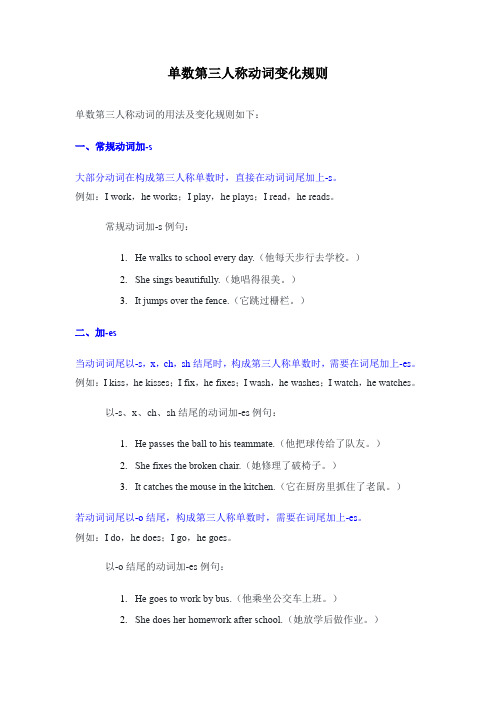
单数第三人称动词变化规则单数第三人称动词的用法及变化规则如下:一、常规动词加-s大部分动词在构成第三人称单数时,直接在动词词尾加上-s。
例如:I work,he works;I play,he plays;I read,he reads。
常规动词加-s例句:1.He walks to school every day.(他每天步行去学校。
)2.She sings beautifully.(她唱得很美。
)3.It jumps over the fence.(它跳过栅栏。
)二、加-es当动词词尾以-s,x,ch,sh结尾时,构成第三人称单数时,需要在词尾加上-es。
例如:I kiss,he kisses;I fix,he fixes;I wash,he washes;I watch,he watches。
以-s、x、ch、sh结尾的动词加-es例句:1.He passes the ball to his teammate.(他把球传给了队友。
)2.She fixes the broken chair.(她修理了破椅子。
)3.It catches the mouse in the kitchen.(它在厨房里抓住了老鼠。
)若动词词尾以-o结尾,构成第三人称单数时,需要在词尾加上-es。
例如:I do,he does;I go,he goes。
以-o结尾的动词加-es例句:1.He goes to work by bus.(他乘坐公交车上班。
)2.She does her homework after school.(她放学后做作业。
)3.It echoes through the canyon.(它在峡谷中回荡。
)三、先将y改变为i,再加上-es。
当动词词尾为以辅音字母+y结尾时,构成第三人称单数时,需要先将y改变为i,再加上-es。
例如:I fly,he flies;I try,he tries;I study,he studies;I carry,he carries。
三单的变形规则
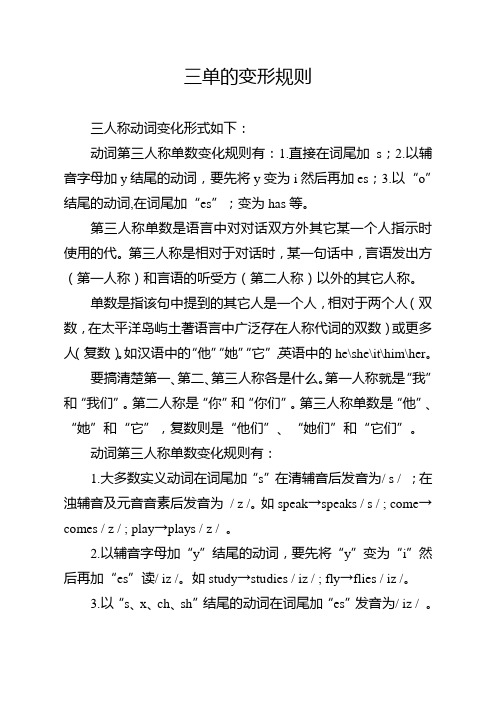
三单的变形规则三人称动词变化形式如下:动词第三人称单数变化规则有:1.直接在词尾加s;2.以辅音字母加y结尾的动词,要先将y变为i然后再加es;3.以“o”结尾的动词,在词尾加“es”;变为has等。
第三人称单数是语言中对对话双方外其它某一个人指示时使用的代。
第三人称是相对于对话时,某一句话中,言语发出方(第一人称)和言语的听受方(第二人称)以外的其它人称。
单数是指该句中提到的其它人是一个人,相对于两个人(双数,在太平洋岛屿土著语言中广泛存在人称代词的双数)或更多人(复数)。
如汉语中的“他”“她”“它”,英语中的he\she\it\him\her。
要搞清楚第一、第二、第三人称各是什么。
第一人称就是“我”和“我们”。
第二人称是“你”和“你们”。
第三人称单数是“他”、“她”和“它”,复数则是“他们”、“她们”和“它们”。
动词第三人称单数变化规则有:1.大多数实义动词在词尾加“s”在清辅音后发音为/ s / ;在浊辅音及元音音素后发音为/ z /。
如speak→speaks / s / ; come→comes / z / ; play→plays / z / 。
2.以辅音字母加“y”结尾的动词,要先将“y”变为“i”然后再加“es”读/ iz /。
如study→studies / iz / ; fly→flies / iz /。
3.以“s、x、ch、sh”结尾的动词在词尾加“es”发音为/ iz / 。
如teach→teaches / iz / ; watch→watches / iz /。
4.以“o”结尾的动词,在词尾加“es”。
常出现的两个以“o”结尾的动词go和do后加“es”读/ z / 。
如go→goes / z / ; do→does / z /。
5.记住最为特别的be的三单is ,have的三单是has。
动词三单的变化规则总结

动词三单的变化规则总结
1.一般情况下,动词在第三人称单数形式中,直接在动词原形后加上-s。
例如:
- he walks (他走路)
- she eats (她吃饭)
- it sleeps (它睡觉)
2. 当动词以s、ss、sh、ch、x、o结尾时,需要在动词原形后加上-es。
例如:
- he passes (他通过)
- she misses (她错过)
- it washes (它洗)
- he watches (他看)
- she fixes (她修理)
- it goes (它去)
3. 当动词以辅音字母+y结尾时,将y变为i,然后再加上-es。
例如:
- he tries (他尝试)
- she carries (她携带)
- it studies (它学习)
4.当动词以元音字母+y结尾时,直接在动词原形后加上-s。
例如:
- he plays (他玩)
- she says (她说)
5. 当动词以辅音字母+o结尾时,需要在动词原形后加上-es。
例如:
- he goes (他去)
- she does (她做)
6. 当动词以辅音字母+o结尾且在末尾之前有一个辅音字母时,需要在动词原形后加上-es。
例如:
- he goes (他走)
- she echoes (她回响)
需要注意的是,以上的规则只适用于大多数动词,但也有一些特殊情况需要记住,比如不规则动词的变化形式。
此外,有些动词在第三人称单数形式中没有变化,即与动词原形相同,比如:she likes (她喜欢)。
动词三单的变化规则

动词三单的变化规则
动词的三单形式是指在第三人称单数主语(he、she、it)下的动词变化。
一般情况下,在动词三单形式中,动词要加-s、-es或-ies。
具体的变化规则如下:
1. 一般规则:大多数动词在第三人称单数时,直接在动词原形后添加-s。
例如:play → plays,talk → talks,run → runs。
2. 以-s、-ss、-sh、-ch、-x、-o结尾的动词:在这些动词的第三人称单数形式中,要在动词原形后添加-es。
例如:pass → passes,brush → brushes,wash → washes,watch → watches。
3. 以辅音字母+y结尾的动词:如果辅音字母y前面是元音字母,则直接在动词原形后添加-s。
例如:play → plays。
如果辅音字母y前面是辅音字母,则将y改为i,再加-es。
例如:carry → carries,study → studies。
4. 不规则变化的动词:有一些动词的第三人称单数形式变化不遵循以上规则,需要记忆这些不规则变化。
例如:be → is,have → has,do → does,go → goes。
需要注意的是,动词的三单形式还会受到时态、语气和语法结构等因素的影响,有时会发生变化。
因此,需要根据具体的语境来确定动词的变化形式。
英语动词第三人称单数变化规则

英语动词第三人称单数变化规则英语动词的第三人称单数变化规则是在动词原形后加上-s或-es。
这个规则适用于大多数动词,但也有一些特殊情况需要注意。
一般规则:大多数动词在第三人称单数时,在动词原形后加上-s。
例如:play → plays, run → runs, dance → dances。
以s, x, ch, sh和o结尾的动词:以s, x, ch, sh和o结尾的动词在第三人称单数时,在动词原形后加上-es。
例如:pass → passes, fix → fixes, watch → watches, go → goes。
以辅音字母+y结尾的动词:以辅音字母+y结尾的动词在第三人称单数时,将y改为i,再加上-es。
例如:study → studies, fly → flies, try → tries。
以元音字母+y结尾的动词:以元音字母+y结尾的动词在第三人称单数时,直接加上-s。
例如:play → plays, pray → prays, enjoy → enjoys。
以辅音字母+o结尾的动词:以辅音字母+o结尾的动词在第三人称单数时,有两种情况:1.如果辅音字母前是一个元音字母,直接加上-s。
例如:go → goes, echo→ echoes。
2.如果辅音字母前是一个辅音字母,需要在动词原形后加上-es。
例如:do →does, go → goes。
不规则变化的动词:不规则变化的动词在第三人称单数时,变化形式与动词原形不同。
例如:be → is/are, have → has, do → does, go → goes。
需要注意的特殊情况:1.当动词原形以s, x, ch, sh和o结尾,并且前面有一个辅音字母时,不需要加上-es。
例如:fix → fixes, watch → watches。
2.当动词原形以辅音字母+y结尾,并且y前面是一个元音字母时,直接加上-s。
例如:play → plays, pray → prays。
英语动词《第三人称单数形式》的变化规则
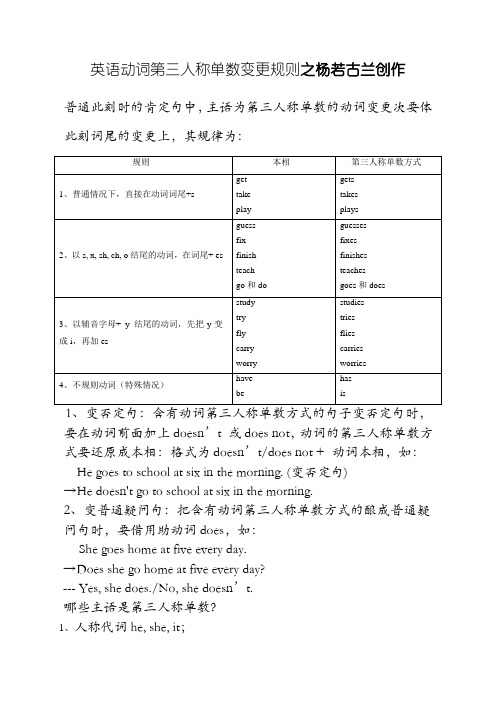
英语动词第三人称单数变更规则之杨若古兰创作普通此刻时的肯定句中,主语为第三人称单数的动词变更次要体此刻词尾的变更上,其规律为:要在动词前面加上doesn’t 或does not,动词的第三人称单数方式要还原成本相:格式为doesn’t/does not + 动词本相,如:He goes to school at six in the morning. (变否定句)→He do esn't go to school at six in the morning.2、变普通疑问句:把含有动词第三人称单数方式的酿成普通疑问句时,要借用助动词does,如:She goes home at five every day.→Does she go home at five every day?--- Yes, she does./No, she doesn’t.哪些主语是第三人称单数?1、人称代词he, she, it;如:He likes watching TV. 他爱好看电视.She has lunch at twelve. 她十二点吃午饭.It looks like a cat. 它看起来像只猫.2、单个人名、地名或称呼作主语;是第三人称单数.如:Han Mei looks like her mother. 韩梅看起来像她的母亲.Beijing is in China. 北京在中国.Uncle Wang often makes cakes. 王叔叔经常做蛋糕.3、单数可数名词或this / that / the+ 单数可数名词作主语时,是第三人称单数;A horse is a useful animal. 马是有效的动物.This book is yours. 这本书是你的.That car is red. 那辆小汽车是红色的.The cat is Lucy's. 只猫是露茜的.4、不成数名词作主语时为第三人称单数.如:The milk is in the glass.牛奶在玻璃杯里.The bread is very small. 那面包很小.The water is very cold. 那些水很凉..例题带路:1、写出以下动词的第三人称单数.drink ________ go _______ stay ________ make ________ look _________have_______ pass_______ carry _______ come________ watch________plant_______ fly ________ study_______ brush________ teach________2、用括号内动词的适当方式填空.1.He often ________(have) dinner at home.2.We _____________ (not watch) TV on Monday.3.Nick ___________ (not go) to the zoo on Sunday.4.________ they __________ (like) the World Cup?5.What _________they often _________ (do) on Saturdays?6._________ your parents _________ (read) newspapers every day?7.There ________(be) some water in the bottle.8.My aunt _______(look) after her baby carefully.9.The child often _______(watch) TV in the evening.10. Mike’s sister ________ (cook) nice food. I _______ (like) e atingit very much.21._______ (do) your brother_______ (watch) TV in the evening? No,he_______ (not).3、选出准确的答案:1. She (like / likes) to play football.2. He (like / likes) drinking milk.3. I (like / likes) to watch TV.4. We (like / likes) to play badminton.5. They (like / likes) to sing songs.6. She (read / reads) books every day.7. He (play / plays) computer games every day.8. It (listen / listens) to the radio every day.9. Linda (draw / draws) pictures every day.10. Jane and Linda (play / plays) football every day.5、把以下句子变成否定句:1. We like playing football.2. Linda swims every day.3. They like playing games.4. My father reads newspaper in the evening.7、把以下句子变成疑问句,并做肯定和否定回答.1. My brother can ride a horse.4. We clean the classroom after school.________________________________________________________ ___。
(完整版)动词第三人称单数的变化规则及练习.docx

动词第三人称单数的变化规则及练习一、变化规则1、直接在动词后 +s例如:like- likes play-plays2、以 s, x, sh, ch, 接尾的动词: +es例如:wash-washes3、以辅音 +o 接尾的动词: +es例如:go-goes4、以辅音 +y 接尾的动词:变y 为 i+es例如:fly-flies动词短语:+s:Plays, skips, sings, gives, starts, likes,buys some toys, gets up comes back homemakes noodles, eats lunch drinks coffeebegins his class , practises the piano+es :watches TV brushes his teethgoes to bed goes to schooldoes my homework does some readingy→ i+ es: fly→ flies study→ studies注意:不规则变化: have-----has,be-------is,do-----does写出下列动词的第三人称单数drink ________ go _______ stay ________ make ________look _________ have_______ pass_______ carry ____come________ watch______ plant_______ fly ________study_______ brush________ do_________ teach_______二、请看下面两组句子,注意区分他们的共同点和不同点。
I go to school every day.I don't go to school every day.He goes to school every day.He doesn't go to school every day.Do you go to school every day?Yes, I do. (No, I don't)Does he go to school every day?Yes, he does. (No, he doesn't)注:1)第三人称单数用了does 后面就不用动词的s 形式了 ,而用动词原形 .。
动词三单的变化规则

动词三单的变化规则
动词第三人称单数变化规则如下:
1)一般情况下,动词后面直接加-s.
例如: works gets says reads
2) 以ch,sh,s,x 或 o 结尾的动词,在后面加 -es。
例如: go- goes teach-,teaches,wash-washes。
brush-brushes ,catch-catches,do-does ,fix -fixes
3) 以辅音字母 + y结尾的动词,把 y变为 i 再加 -es. 例如:study- studies try-tries carry-carries,fly-flies
一般现在时的肯定句中,主语为第三人称单数的动词变化主要体现在词尾的变化上,其规律大体有三点:
(1) 一般情况下由动词后加-s构成。
如work / works
(2) 以s, x, z, sh, ch 以及字母o结构的动词,后加-es:
guess / guesses, mix / mixes, go /
goes, buzz / buzzes, finish / finishes, catch / catches等。
(3) 以辅音字母加y结尾的动词,应将y改为i 再加-es:fly / flies, study / studies
等。
【注】①有个别的变化不规则,如have / has, be / is等。
②词尾-s和-es 读音规则是:在s, x, z, sh, ch 后的es读作[iz],其余的读作[z]。
英语三单形式变化规则
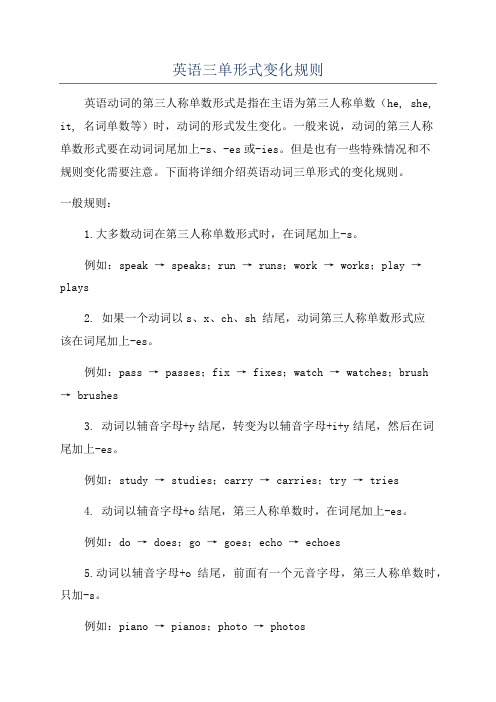
英语三单形式变化规则英语动词的第三人称单数形式是指在主语为第三人称单数(he, she, it, 名词单数等)时,动词的形式发生变化。
一般来说,动词的第三人称单数形式要在动词词尾加上-s、-es或-ies。
但是也有一些特殊情况和不规则变化需要注意。
下面将详细介绍英语动词三单形式的变化规则。
一般规则:1.大多数动词在第三人称单数形式时,在词尾加上-s。
例如:speak → speaks;run → runs;work → works;play → plays2. 如果一个动词以s、x、ch、sh 结尾,动词第三人称单数形式应该在词尾加上-es。
例如:pass → passes;fix → fixes;watch → watches;brush→ brushes3. 动词以辅音字母+y结尾,转变为以辅音字母+i+y结尾,然后在词尾加上-es。
例如:study → studies;carry → carries;try → tries4. 动词以辅音字母+o结尾,第三人称单数时,在词尾加上-es。
例如:do → does;go → goes;echo → echoes5.动词以辅音字母+o结尾,前面有一个元音字母,第三人称单数时,只加-s。
例如:piano → pianos;photo → photos6. 动词以辅音字母+consonant字母+ y 结尾,将y改为ies。
例如:study → studies;fly → flies;cry → cries7.动词以“辅音字母+_y”的形式结尾,但是该辅音字母前是一个元音字母。
这种情况下,动词的第三人称单数形式在词尾加上-s。
例如:play → plays;pray → prays;enjoy → enjoys不规则变化:除了一般的规则以外,还有一些常见的动词变化形式是不规则的,需要单独记忆。
1. be → is(am,are)例如:She is a student. → He is a teacher.注意:be动词变化形式较为特殊,主语为第三人称单数时,is是be 动词的正确形式。
动词第三人称单数形式的变化规则

动词第三人称单数形式的变化规则下载提示:该文档是本店铺精心编制而成的,希望大家下载后,能够帮助大家解决实际问题。
文档下载后可定制修改,请根据实际需要进行调整和使用,谢谢!本店铺为大家提供各种类型的实用资料,如教育随笔、日记赏析、句子摘抄、古诗大全、经典美文、话题作文、工作总结、词语解析、文案摘录、其他资料等等,想了解不同资料格式和写法,敬请关注!Download tips: This document is carefully compiled by this editor. I hope that after you download it, it can help you solve practical problems. The document can be customized and modified after downloading, please adjust and use it according to actual needs, thank you! In addition, this shop provides you with various types of practical materials, such as educational essays, diary appreciation, sentence excerpts, ancient poems, classic articles, topic composition, work summary, word parsing, copy excerpts, other materials and so on, want to know different data formats and writing methods, please pay attention!动词第三人称单数形式是指表示第三人称单数主语时的动词形式。
动词第三人称单数变化规律
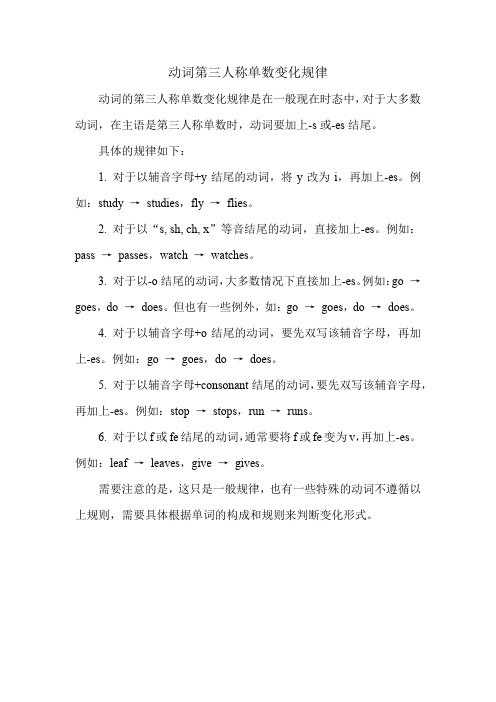
动词第三人称单数变化规律
动词的第三人称单数变化规律是在一般现在时态中,对于大多数动词,在主语是第三人称单数时,动词要加上-s或-es结尾。
具体的规律如下:
1. 对于以辅音字母+y结尾的动词,将y改为i,再加上-es。
例如:study →studies,fly →flies。
2. 对于以“s, sh, ch, x”等音结尾的动词,直接加上-es。
例如:pass →passes,watch →watches。
3. 对于以-o结尾的动词,大多数情况下直接加上-es。
例如:go →goes,do →does。
但也有一些例外,如:go →goes,do →does。
4. 对于以辅音字母+o结尾的动词,要先双写该辅音字母,再加上-es。
例如:go →goes,do →does。
5. 对于以辅音字母+consonant结尾的动词,要先双写该辅音字母,再加上-es。
例如:stop →stops,run →runs。
6. 对于以f或fe结尾的动词,通常要将f或fe变为v,再加上-es。
例如:leaf →leaves,give →gives。
需要注意的是,这只是一般规律,也有一些特殊的动词不遵循以上规则,需要具体根据单词的构成和规则来判断变化形式。
(完整word版)动词第三人称单数变化规则如下
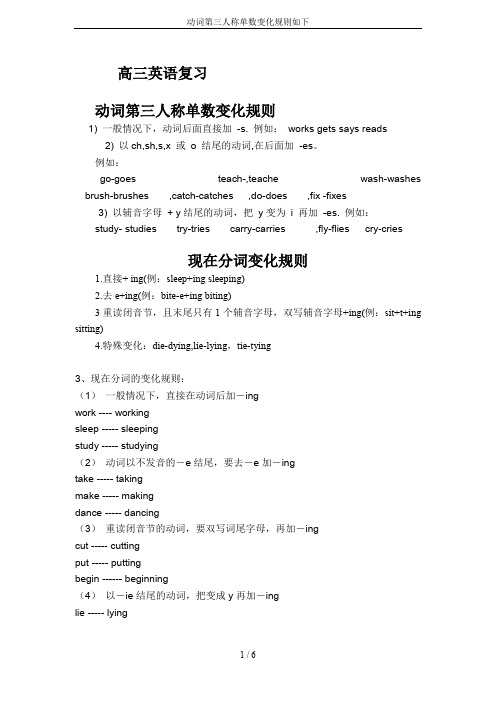
高三英语复习动词第三人称单数变化规则1) 一般情况下,动词后面直接加-s. 例如:works gets says reads2) 以ch,sh,s,x 或o 结尾的动词,在后面加-es。
例如:go-goes teach-,teache wash-washes brush-brushes ,catch-catches ,do-does ,fix -fixes3) 以辅音字母+ y结尾的动词,把y变为i 再加-es. 例如:study- studies try-tries carry-carries ,fly-flies cry-cries现在分词变化规则1.直接+ ing(例:sleep+ing sleeping)2.去e+ing(例:bite-e+ing biting)3重读闭音节,且末尾只有1个辅音字母,双写辅音字母+ing(例:sit+t+ing sitting)4.特殊变化:die-dying,lie-lying,tie-tying3、现在分词的变化规则:(1)一般情况下,直接在动词后加-ingwork ---- workingsleep ----- sleepingstudy ----- studying(2)动词以不发音的-e结尾,要去-e加-ingtake ----- takingmake ----- makingdance ----- dancing(3)重读闭音节的动词,要双写词尾字母,再加-ingcut ----- cuttingput ----- puttingbegin ------ beginning(4)以-ie结尾的动词,把变成y再加-inglie ----- lyingtie ----- tyingdie ----- dying① 一般单音节词末尾加er 和est② 单音节词如果以e结尾,只加r 和st③ 闭音节单音节词如末尾只有一个辅音字母,须先双写这个辅音字母,再加er和est ④ 少数以y,er(或ure),ow,ble 结尾的双音节词,末尾加er和est(以y结尾的词,如y前是辅音字母,把y变成i,再加er和est,以e结尾的词仍加r和st)late later latest3. big bigger biggesthot hotter hottestthin thinner thinnest4. easy easier easiestbusy busier busiesthappy happier happiest5. valuable more valuable most valuabledangerous more dangerous most dangerouscomfortable more comfortable most comfortable1. 有几个形容词有特殊的比较级和最高级形式:原级比较级最高级good well better bestbad ill worse worstmany much more mostlittle less least far farther further farthest furthestold older elder oldest eldest2. 双音节词除了以“辅音+y”结尾的词外,还有以ow, er, le结尾的词,和个别其他双音节词,可以用加词尾的办法构成比较级和最高级:原级比较级最高级narrow narrower narrowestclever cleverer cleverestsimple simpler simplestcommon commoner commonest3. 也有少数单音节词可以加more和most的办法构成比较级和最高级:原级比较级最高级pleased more pleased most pleasedtired more tired most tiredglad more glad most glad名词的复数形式其它名词复数的规则变化1) 以y结尾的专有名词,或元音字母+y 结尾的名词变复数时,直接加s变复数:如:two Marys the Henrysmonkey---monkeys holiday---holidays比较:层楼:storey ---storeys story---stories2) 以o 结尾的名词,变复数时:a. 加s,如:photo---photos piano---pianosradio---radios zoo---zoos;b. 加es,如:potato--potatoes tomato--tomatoesc. 均可,如:zero---zeros / zeroes3) 以f或fe 结尾的名词变复数时:a. 加s,如:belief---beliefs roof---roofssafe---safes gulf---gulfs;b. 去f,fe 加ves,如:half---halvesknife---knives leaf---leaves wolf---wolveswife---wives life---lives thief---thieves;c. 均可,如:handkerchief:handkerchiefs / handkerchieves动词变名词1.在词尾加er,r ,双写加er 或or:A. play _ player, sing _ singer, wait _ waiter , find _ finder,thrill _ thriller,hunt-hunterB. write _ writer, drive _ driver, come _ comer, explore _ explorerdance _ dancerC. run _ runner, win _ winner, rob _ robber, traval _ travallerD. visit _ visitor, invent _ inventor,act-actor,advise-advisor2. 在词尾加ing:build _ building, draw _ drawing, end _ ending, begin _ beginning,swim _ swimming,skate _ skating, feel _ feeling, say _ saying,mean _ meaning, cross _ crossing,surf _ surfing, paint _ painting3.在词尾加ion 或去e加ion:A. decide _ decision, describe _ description, produce _ production, celebrate _ celebration,pronounce _ pronunciation, decorate _ decoration graduate _ graduation,frustrate - frustration,pollute _ pollutioncontribute _ contribution, congratulate _ congratulation,educate _ education,organize _ orgnization,donate _ donation, appreciate _ appreciation,operate _ operation, invite _ invitationB. discuss _ discussion, invent _ invention, attract _ attractionimpress _ impression,inject _ injection,instruct _ instruction4.其它:know _ knowledge, please _ pleasure, enjoy _ enjoyment,practise _ practice,die _ death, succeed _ success, weigh _ weight,sit _ deat, change _ chance,enter _ entrance,fly _ flight,rob _ robbery, discover _ discovery,faile _ failure,appear _ appearance, breathe _ breath。
动词单三式变化规律是什么
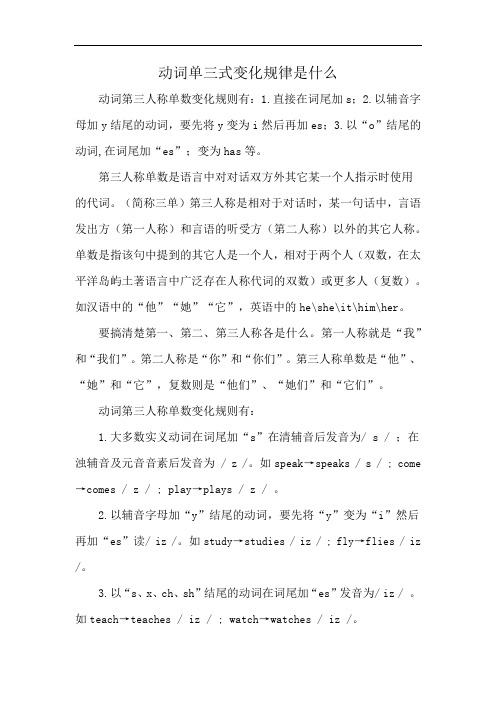
动词单三式变化规律是什么动词第三人称单数变化规则有:1.直接在词尾加s;2.以辅音字母加y结尾的动词,要先将y变为i然后再加es;3.以“o”结尾的动词,在词尾加“es”;变为has等。
第三人称单数是语言中对对话双方外其它某一个人指示时使用的代词。
(简称三单)第三人称是相对于对话时,某一句话中,言语发出方(第一人称)和言语的听受方(第二人称)以外的其它人称。
单数是指该句中提到的其它人是一个人,相对于两个人(双数,在太平洋岛屿土著语言中广泛存在人称代词的双数)或更多人(复数)。
如汉语中的“他”“她”“它”,英语中的he\she\it\him\her。
要搞清楚第一、第二、第三人称各是什么。
第一人称就是“我”和“我们”。
第二人称是“你”和“你们”。
第三人称单数是“他”、“她”和“它”,复数则是“他们”、“她们”和“它们”。
动词第三人称单数变化规则有:1.大多数实义动词在词尾加“s”在清辅音后发音为/ s / ;在浊辅音及元音音素后发音为 / z /。
如speak→speaks / s / ; come →comes / z / ; play→plays / z / 。
2.以辅音字母加“y”结尾的动词,要先将“y”变为“i”然后再加“es”读/ iz /。
如study→studies / iz / ; fly→flies / iz /。
3.以“s、x、ch、sh”结尾的动词在词尾加“es”发音为/ iz / 。
如teach→teaches / iz / ; watch→watches / iz /。
4.以“o”结尾的动词,在词尾加“es”。
常出现的两个以“o”结尾的动词go和do后加“es”读/ z / 。
如go→goes / z / ; do →does / z /。
5.记住最为特别的be的三单is ,have的三单是has。
注意:a、下面两个动词变三单时,原词的元音部分的发音发生了较大的变化,要记忆。
(完整版)动词第三人称单数形式

动词第三人称单数形式主语有三单,动词也有三单,快点来习惯,体会在心里,一定要过关.一、概念动词第三人称单数:主语是第三人称单数,即谓语动词的发出者是it、she、he、可数名词单数、不可数名词等表示单数概念的词时,实义动词后面要加-s或-es。
(注意:若主语不是第三人称单数形式,就直接用动词原形;若主语是三单,后有will等情态动词修饰时,动词也用原形。
)二、动词三单变化规则(只有一般现在时才有第三人称单数)动词第三人称单数的变化规则及发音规律,同名词单数变复数大致相同,请认真观察。
1、大多数实义动词在词尾加“s”,在清辅音后发音为/ s / ,在浊辅音及元音因素后发音为/ z /。
如:speak→speaks /s/ ; come→comes /z/ ; play→plays /z/2、以辅音字母加“y”结尾的动词,要先将“y”变为“i”,然后再加“es”,读/z/。
如:study→studies /z/ ; fly→flies /z/3、以“s,x,ch,sh”结尾的动词,在词尾加“es”,发音为/ iz / 。
如:teach→teaches /iz/ ; watch→watches /iz/4、以“o”结尾的动词,在词尾加“es”。
常出现的两个以“o”结尾的动词go和do后加“es”,读/z/ 。
如:go→goes /z/ ; do→does /z/5、记住最为特别的be的三单is ;have的三单是has。
[注意](1)下面两个动词变三单时,原词的元音部分的发音发生了较大的变化,要记忆。
如:do/du:/ →does/d z/ ; say/sei/ →says /sez/发音,后字母“e”(2)以不发音字母“e”结尾的开音节词,如果尾音是[s],[z]时,加“s”一起读做[iz]。
如:close-closes [iz]与所加“s” 三、动词第三人称单数的句子结构。
1、肯定/否定句三单+is +表语. 三单+动词第三人称单数+其他.三单+is+not+表语 . 三单+doesn't +动词原形+其他.2、一般疑问句1)当谓语动词是be动词时,一般疑问句结构为“Is+三单+表语?”。
动词《第三人称单数形式》的变化规则

小学英语动词第三人称单数变化规则一般现在时的肯定句中,主语为第三人称单数的动词变化主要体现在词尾的变化上,其规律为:1、变否定句:格式为doesn’t/does not + 动词原形,如:He goes to school at six in the morning. (变否定句)→He doesn't go to school at six in the morning.2、变一般疑问句:要借用助动词does,如:She goes home at five every day.→Does she go home at five every day?--- Yes, she does./No, she doesn’t.哪些主语是第三人称单数?除I、you之外的所有可数名词单数及不可数名词。
(he she it 个人名)例题引路:判断下列词语哪些是第三人称单数,是请打“√”不是请打“×”。
he ( ) we( ) she( ) they( )it ( ) Han Mei ( ) uncle Wang ( )the farmers( ) my mother( ) Linda( )Sally and Lucy( ) the dog( ) the cats( )1、写出下列动词的第三人称单数。
drink ________ go _______ stay ________ make ________ look _________ have_______ pass_______ carry _______ come________ watch________ plant_______ fly ________ study_______ brush________ teach________ 2、用括号内动词的适当形式填空。
1. He often ________(have) dinner at home.2. We _____________ (not watch) TV on Monday.3. Nick ___________ (not go) to the zoo on Sunday.4. ________ they __________ (like) the World Cup?5. What _________they often _________ (do) on Saturdays?6. _________ your parents _________ (read) newspapers every day?7. There ________(be) some water in the bottle.8. My aunt _______(look) after her baby carefully.9. The child often _______(watch) TV in the evening.10. Mike’s sister ________ (cook) nice food. I _______ (like) eating it very much. 21. _______ (do) your brother_______ (watch) TV in the evening? No, he_______ (not).3、选出正确的答案:1. She (like / likes) to play football.2. He (like / likes) drinking milk.3. I (like / likes) to watch TV.4. We (like / likes) to play badminton.5. They (like / likes) to sing songs.6. She (read / reads) books every day.7. He (play / plays) computer games every day.8. It (listen / listens) to the radio every day.9. Linda (draw / draws) pictures every day.10. Jane and Linda (play / plays) football every day.5、把下列句子变为否定句:1. We like playing football.2. Linda swims every day.3. They like playing games.4. My father reads newspaper in the evening.7、把下列句子变为疑问句,并做肯定和否定回答。
- 1、下载文档前请自行甄别文档内容的完整性,平台不提供额外的编辑、内容补充、找答案等附加服务。
- 2、"仅部分预览"的文档,不可在线预览部分如存在完整性等问题,可反馈申请退款(可完整预览的文档不适用该条件!)。
- 3、如文档侵犯您的权益,请联系客服反馈,我们会尽快为您处理(人工客服工作时间:9:00-18:30)。
英语动词第三人称单数变化规则
一般现在时的肯定句中,主语为第三人称单数的动词变化主要体现在词尾的变化上,其规律为:
1、变否定句:含有动词第三人称单数形式的句子变否定句时,要在动词前面加上doesn’t 或does not,动词的第三人称单数形式要还原成原形:格式为doesn’t/does not + 动词原形,如:
He goes to school at six in the morning. (变否定句)
→He doesn't go to school at six in the morning.
2、变一般疑问句:把含有动词第三人称单数形式的变成一般疑问句时,要借用助动词does,如:
She goes home at five every day.
→Does she go home at five every day?
--- Yes, she does./No, she doesn’t.
哪些主语是第三人称单数?
1、人称代词he, she, it;
如:He likes watching TV. 他喜欢看电视。
She has lunch at twelve. 她十二点吃午餐。
It looks like a cat. 它看起来像只猫。
2、单个人名、地名或称呼作主语;是第三人称单数。
如:
Han Mei looks like her mother. 韩梅看起来像她的母亲。
Beijing is in China. 北京在中国。
Uncle Wang often makes cakes. 王叔叔经常做蛋糕。
3、单数可数名词或this / that / the + 单数可数名词作主语时,是第三人称单数;
A horse is a useful animal. 马是有用的动物。
This book is yours. 这本书是你的。
That car is red. 那辆小汽车是红色的。
The cat is Lucy's. 只猫是露茜的。
4、不可数名词作主语时为第三人称单数。
如:
The milk is in the glass.牛奶在玻璃杯里。
The bread is very small. 那面包很小。
The water is very cold. 那些水很凉。
例题引路:
1、写出下列动词的第三人称单数。
drink ________ go _______ stay ________ make ________ look _________ have_______ pass_______ carry _______ come________ watch________ plant_______ fly ________ study_______ brush________ teach________
2、用括号内动词的适当形式填空。
1. He often ________(have) dinner at home.
2. We _____________ (not watch) TV on Monday.
3. Nick ___________ (not go) to the zoo on Sunday.
4. ________ they __________ (like) the World Cup?
5. What _________they often _________ (do) on Saturdays?
6. _________ your parents _________ (read) newspapers every day?
7. There ________(be) some water in the bottle.
8. My aunt _______(look) after her baby carefully.
9. The child often _______(watch) TV in the evening.
10. Mike’s sister ________ (cook) nice food. I _______ (like) eating it very much. 21. _______ (do) your brother_______ (watch) TV in the evening? No, he_______ (not).
3、选出正确的答案:
1. She (like / likes) to play football.
2. He (like / likes) drinking milk.
3. I (like / likes) to watch TV.
4. We (like / likes) to play badminton.
5. They (like / likes) to sing songs.
6. She (read / reads) books every day.
7. He (play / plays) computer games every day.
8. It (listen / listens) to the radio every day.
9. Linda (draw / draws) pictures every day.
10. Jane and Linda (play / plays) football every day.
5、把下列句子变为否定句:
1. We like playing football.
2. Linda swims every day.
3. They like playing games.
4. My father reads newspaper in the evening.
7、把下列句子变为疑问句,并做肯定和否定回答。
1. My brother can ride a horse.
4. We clean the classroom after school.
___________________________________________________________。
